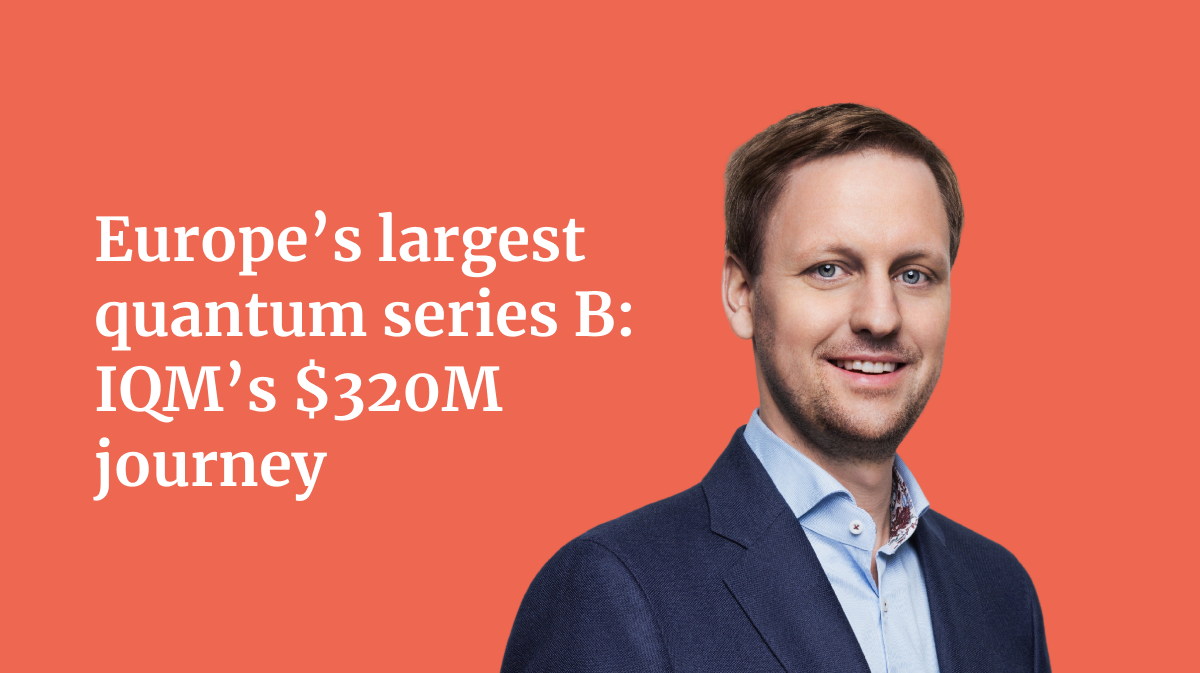Maria 01, Building 5, entrance B
Lapinlahdenkatu 16, 00180 Helsinki
Making history? lets@maki.vc
Press inquiries: press@maki.vc
Blog | Sep 8, 2025

In this post, we look at what it takes to scale deep tech through the story of IQM, which has just closed a record $320M Series B — Europe’s largest quantum round.
Founded as a Finnish research spin-out, IQM is now a global quantum frontrunner pushing Europe into the lead of the next big tech race. At Maki, we’ve been proud to back IQM from day 0. We sat down with co-founder and CEO Jan Goetz to talk about the Europe’s place in quantum, the first applications, and what it takes to scale science into product.
IQM just raised the largest quantum Series B outside the U.S. What does it say about Europe’s position in the global quantum race?
It shows that Europe can compete on a global scale, both in terms of technology as well as in terms of investments. There is lots of innovation happening in Europe and when you manage to build great products out of the early research, it is possible to scale companies. In our case, we took the decades of research in Finland and turned it into the fact that we now have sold most quantum computers globally.
Quantum is often described as the “next big revolution” in tech. Which applications do you think will become real sooner than most people expect?
Applications will be unlocked step-wise as quantum computers become more powerful, similar to AI, which has been enabled by progress in GPUs. Those processors were developed for visual tasks first, then came crypto, simulations, and now LLMs. We believe that in quantum computing the first applications will come in molecular design and materials research. Here quantum computers emulate other quantum systems. Then we will see optimization tasks and finally also AI applications, which are accelerated by quantum computing.
You’ve taken IQM from a research spin-out to a global quantum leader. What’s been the most unexpected challenge, or learning, in scaling a deep tech company?
One challenge is always to manage expectations. One might think that being successful and reaching many milestones quickly is a good thing (which it is). However, it also comes with the expectations that things will always continue that way. But building a deep-tech company is hard and there are always things that hit you back. Projects get delayed, sales don’t come as expected, or the product doesn’t work immediately. Managing the expectations of your team, employees, investors, and other stakeholders can be challenging at times.
What does it take to build a team that can bridge world-class research and global execution?
Building a high-performance leadership team was not as easy as I thought. We managed to hire a strong team of quantum experts in the beginning, and I was used to managing scientific teams from my university times. However, building a team of senior executives with experienced professionals in Finance, Sales, Operations, etc., was something that I was not prepared for. My clear learning was that people-related challenges can be as hard as quantum physics. However, once you manage to bring the right people in, you realize how powerful a strong team is.
Looking back, is there a decision you’d unquestionably make again, or one you’d approach differently, that shaped IQM’s path?
When we were raising our Seed round, we asked people from our scientific network whether they would join our company if we got the money. Many of them said yes. This way, we got a team of about 20 early employees together without any recruiting. These are all great people we trusted and of whom we knew they would bring the company forward. Almost all of them are still with IQM, which makes me proud. This team of early IQMers has really built the heart and culture, especially when times got tough.
For early-stage deep tech founders today, what’s the one piece of advice you’d share about turning a scientific breakthrough into a global company?
Focus on the product! In academia we learn to answer scientific questions. However, we don’t think so much about whether people really need the technology we develop. In a company that’s different. Nobody will buy your science; customers want products that solve their problems. Turning science into product is the most important thing. That starts with the mindset of deep-tech founders, who should think from day 1 about what it is they will actually be selling and why someone would buy it.